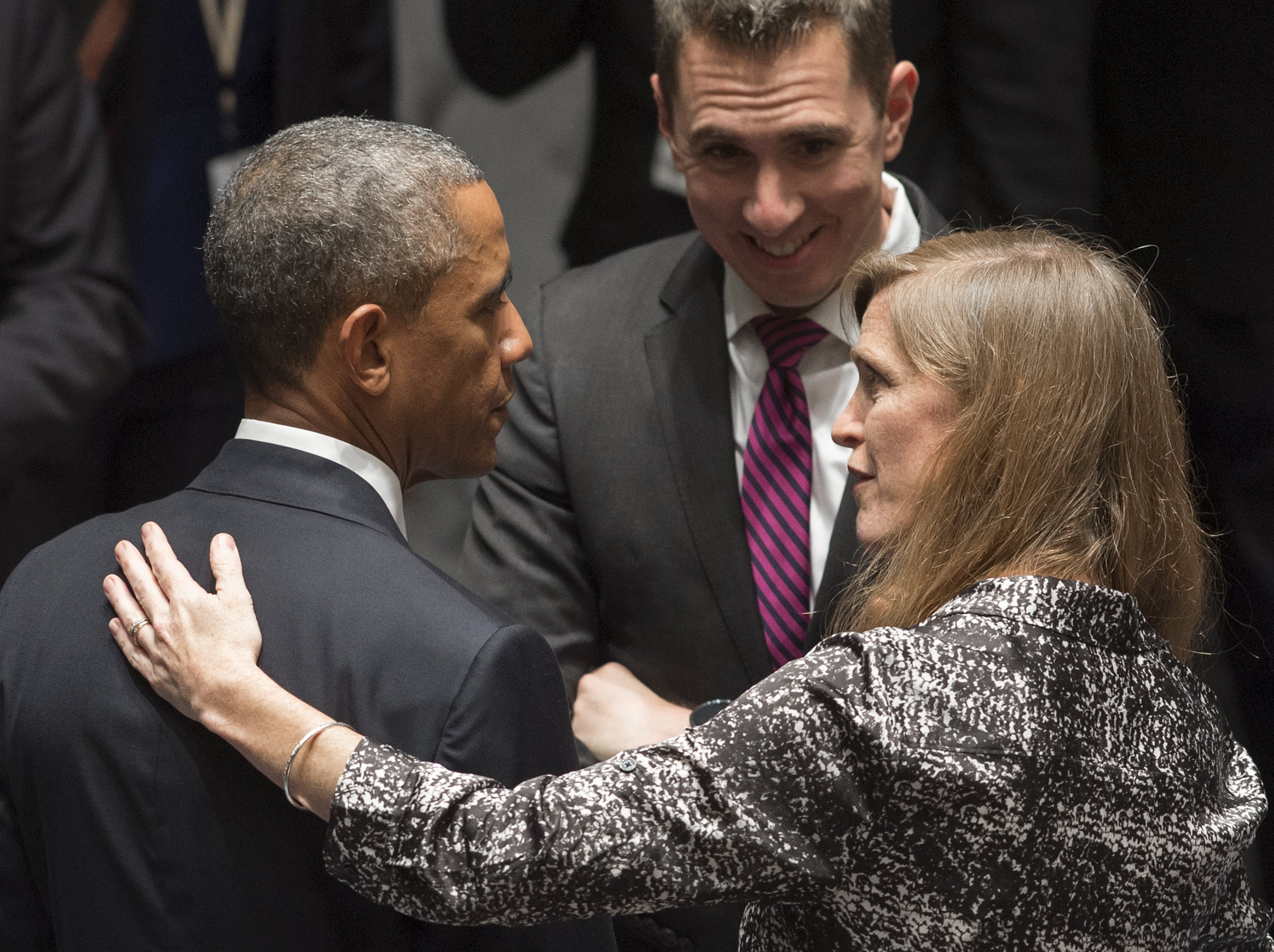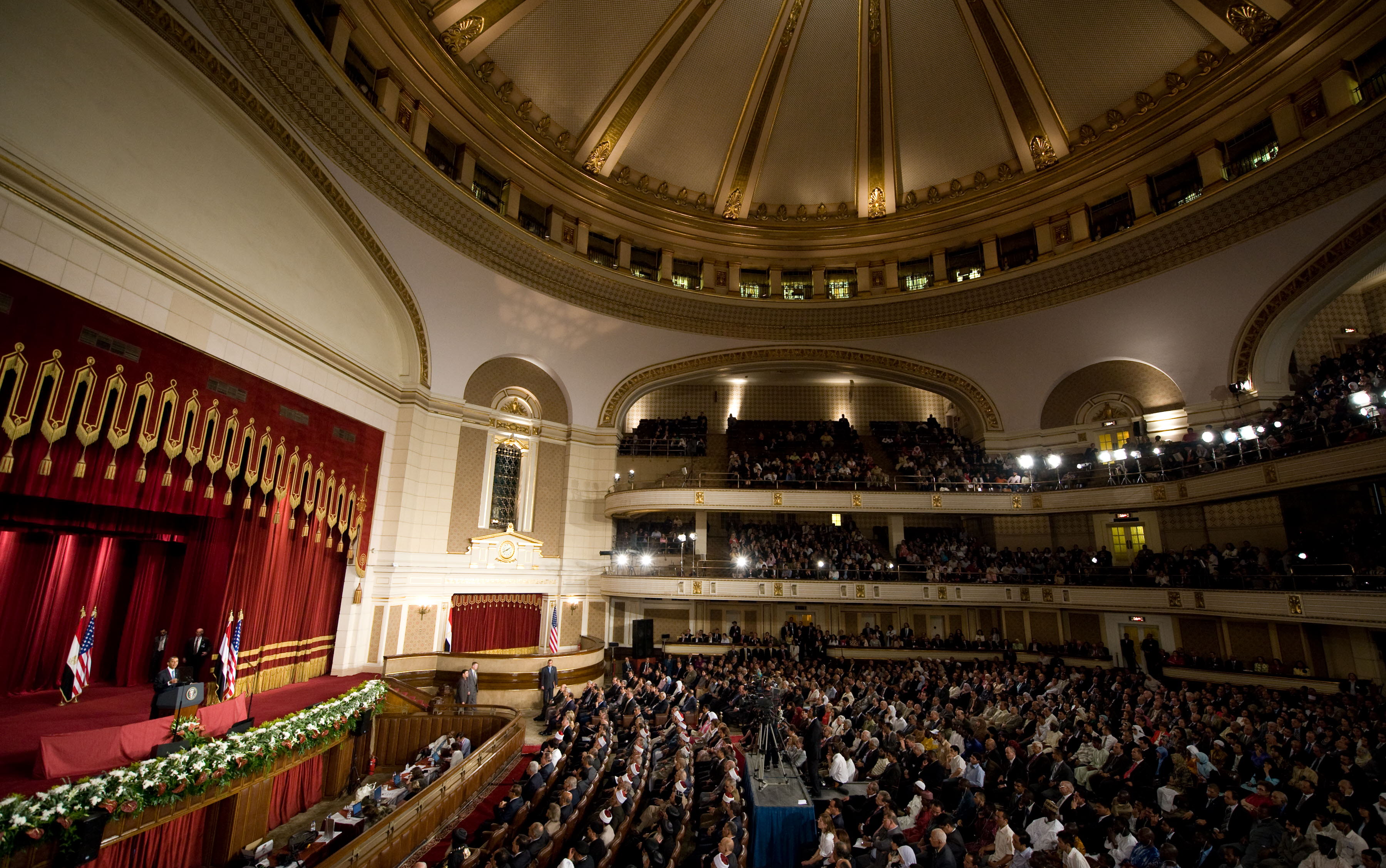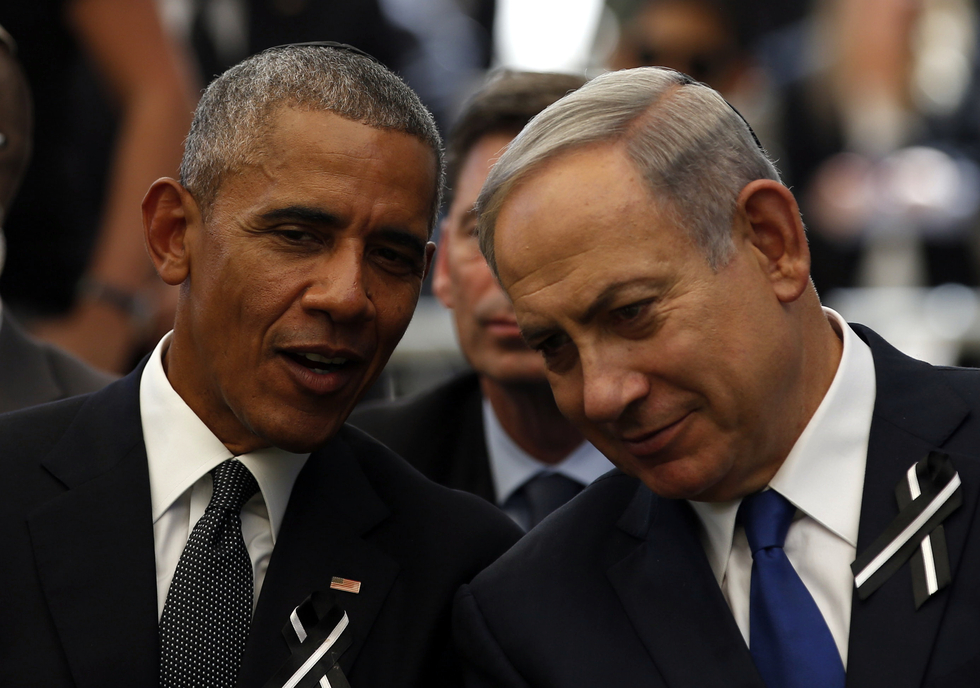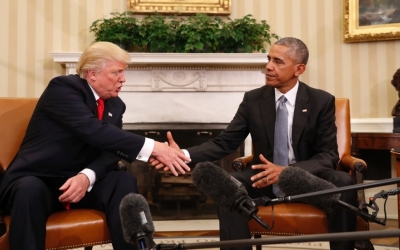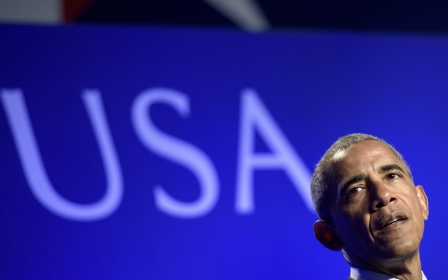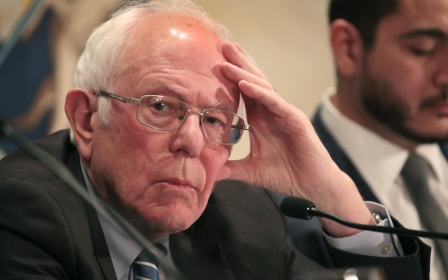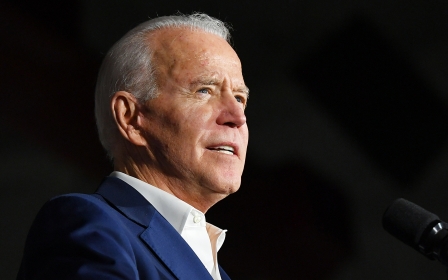Samantha Power: Idealism in service of empire
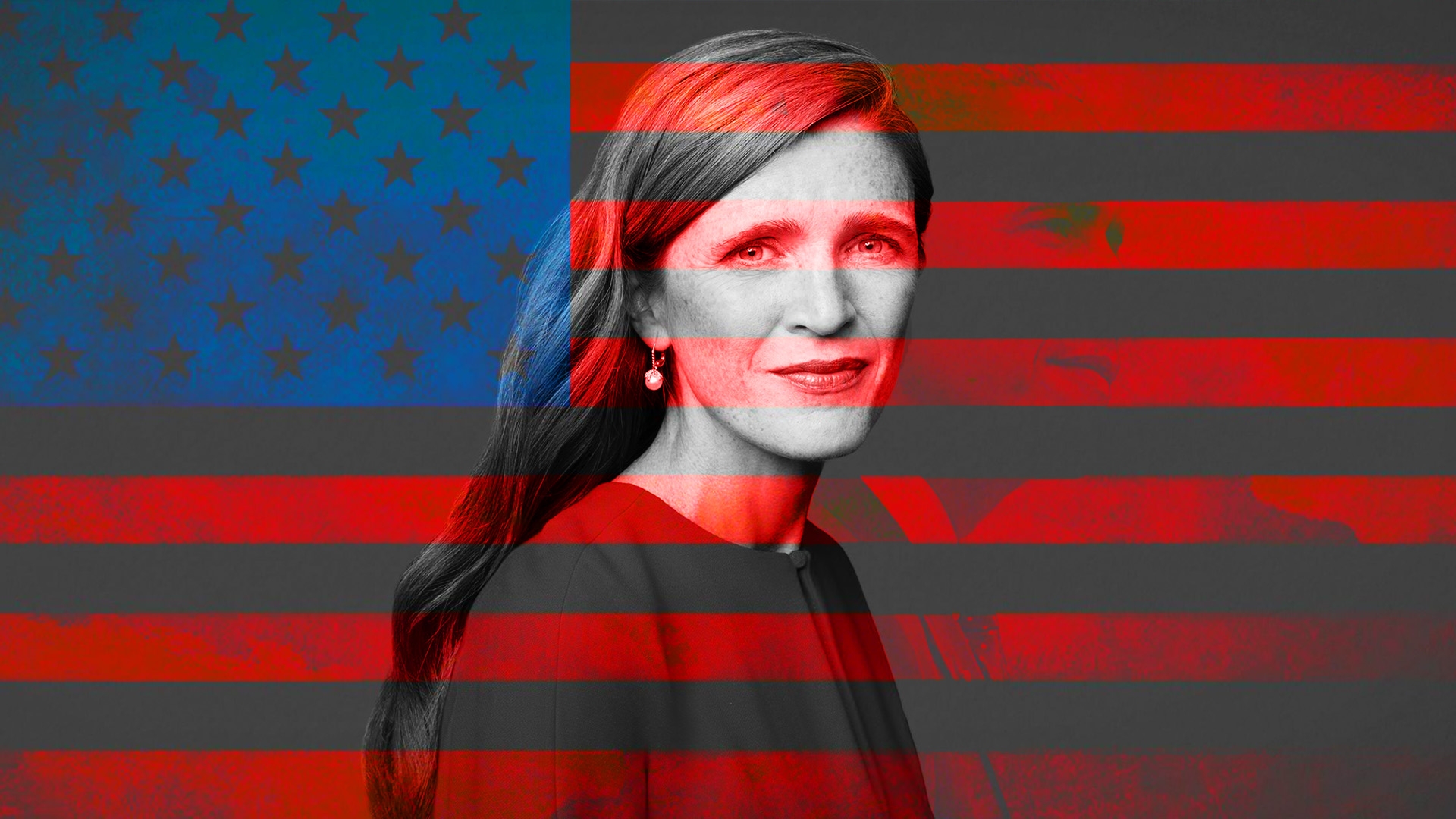
At a private dinner at the White House in May 2013, then US President Barack Obama invited Samantha Power to take the role of US ambassador to the United Nations.
Power had made her name as the 2003 Pulitzer prize-winning author who had chronicled the failure of the US to stop some of the major crimes, including genocide, of the 20th century. She first worked with then senator Obama as an advisor before joining his administration in 2008.
In becoming part of Obama’s government, Power switched from foreign policy critic to foreign policy advisor, to ultimately the defender of US foreign policy as ambassador during his second term.
Even though she had been working within the National Security Council (NSC) as a senior director for multilateral affairs for the administration, it was a tremendous leap for the former journalist and Harvard professor.
Making a difference
Her journey, narrated in her new book An Education of an Idealist (Dey Street), is an exploration of her life and career, from growing up in Ireland to moving to the US, her interest in politics and journalism and ultimately, the experiment of being on the other side of the line.
In becoming part of Obama’s government, Power switched from the foreign policy critic to foreign policy advisor to ultimately the defender of US foreign policy
"Some may interpret the book’s title as suggesting that I began with lofty dreams about how one person could make a difference, only to be 'educated' by the brutish forces that I encountered. That is not the story that follows,” wrote 49-year-old Power.
Yet in many ways, this is precisely the story that follows.
"I knew I was tired of being a professional foreign policy critic, opining and judging without ever knowing whether I would pass the moral and political tests to which I was subjecting others," Power continues.
But there are two fundamental flaws with Power’s thesis. First, her problem isn’t as original as she suggests.
This is the story of activists and journalists, trade unionists, philosophers and preachers who make their way into government the world over, who “learn” that the system has the tendency to force the most ardent radicals to "mature" or "evolve". In other words, it swallows aspirations whole.
American exceptionalism
Secondly, she bet everything on a resolute belief in American exceptionalism as a core value, despite repeatedly alluding to knowing better. Her rigour as a thinker and remarkable turn of phrase as a writer aside, the genuflection to American comfort is jarring.
Power's rigour as a thinker and remarkable turn of phrase as a writer aside, the allusions to American comfort is jarring
For instance, when she initially battles to make headway on a certain set of human rights issues in Obama's administration, Richard Holbrooke, the then special representative for Afghanistan and Pakistan, advises her: "Do good where you can do good … They don’t have another hope besides America."
So she decides to stick it out.
Later, as the ambassador to the UN, when she senses her staff seem weary or forlorn, she would remind them: “Remember, for as long as we work here, we get to be the United States - let’s not forget that.”
And she does so, while simultaneously arguing that US "government officials know very little about foreign places and peoples whose fates their decision would impact".
Venerating Obama
Her best efforts to assuage a healthy scepticism of American foreign policy aside, Power also peddles in the same nostalgia for the Obama era as several of his former aides do, through a process of clever omission.
Obama might have "ended" torture, as Power notes, but she makes no reference for his administration’s preferred method of war: drone strikes
She credits Obama for “banning violators of human rights from entering the United States”, even as the Indian Prime Minister Narendra Modi, the man known as the “Butcher of Gujarat” for his failure to stop the mass killing of Muslims in the state when he was the chief minister in 2002, is allowed back into the US under Obama’s watch. Modi had been previously banned from the country.
Obama might have "ended" torture, as Power notes, but she makes no reference to his administration’s preferred method of war: drone strikes. During this presidency, Obama had ordered 542 drone strikes that killed an estimated 3,797 people, including 324 civilians. He also reportedly told a senior aide: "It turns out I am really good at killing people."
It is then extremely odd that Power, who posits herself as someone who is almost always conflicted by the use of American force, doesn't express even an iota of discontent or dissonance to the immense violence of his presidency.
Obama might have promised to run a transparent administration, but not only did his government turn out to be among the most secretive, his office also oversaw an unprecedented crackdown on journalists in matters of national security. In 2014, his administration reportedly set a record for denying and censoring requests for government information, the kind of data Power once requested herself to write her first book. She says nothing about this, either.
Power credits Obama for his leadership in tackling the Ebola crisis that began in late 2013, but she doesn’t acknowledge that it was only after an American was diagnosed with Ebola in July 2014 that US authorities began to take the virus seriously. Thousands died because of the failures of the World Health Organisation and the western world.
That former vice-president and current Democratic Party presidential hopeful Joe Biden has since evoked the administration’s tackling of Ebola as an example of how he would approach the coronavirus pandemic should he become president is a wretched retelling of how the US initially responded.
Then, there is the flattening of Libya in 2011 that Power mostly glazes over.
Also little more than a footnote is the Saudi-led war in Yemen that turned the poorest Arab country into the world’s worst humanitarian crisis by the end of the Obama administration.
To those impacted by Obama’s policies, this revisionist glossing of Obama's record is no less insulting than Trump’s many falsehoods.
Samantha Power did not respond to MEE’s request for comment.
On Syria
It is the war in Syria that seemingly torments Power.
To those impacted by Obama’s policies, these revisionist overtures to Obama are no less insulting than Trump’s many falsehoods
In one of the key arguments of her first book “A Problem from Hell” that elevated her into the national spotlight in the early 2000s, she had emphasised the US had a “large toolbox” when it came to preventing mass atrocities, one that need not always involve military action.
She describes her hope that Obama would eventually intervene and put an end to the misery in the country, and expresses her disappointment when he decides against it.
Power agonizes over this failure; for her it is the single most visceral challenge to her former self. Again, it’s a half truth. She omits the role played by the CIA in training rebels in Syria, an effort that led in part to the arming of Al-Qaeda fighters.
More crucially, she agonises over a false dilemma, once more.
The decision to not act (in the way she had hoped) was political, just as a decision to intervene in Syria would have been so, too. The suggestion that any of these actions may have been driven by a moral impulse instead of the strategic calculations of an imperialist power is astounding.
Moreover, the idea that an Obama intervention would have told us something about America that we already didn’t know seems at worst disingenuous and at best, wishful thinking.
In fact, Power admits that she had to consciously remind herself that she needed to stick around to make sure that Syria (and other so-called forgotten human rights issues) would find a voice in Obama's administration.
Liberal Islamophobia
Being a female correspondent today is hard. Being one in the 90s would have been especially hard. In the corridors of American diplomacy, too, Power faced up to the immense rigours of everyday sexism.
The idea that an Obama intervention in Syria would have told us something about America that we already didn’t know seems at worse appalling and at best, wishful thinking
But Power, like many American foreign correspondents or liberal commentators, is seemingly unable or unwilling to address severe blindspots of her own privilege. And so the Power who speaks off the misogyny faced by herself and colleagues, fails to recognise the casual orientalism and liberal Islamophobia of her words.
Consider how she describes Obama’s speech in Cairo in June 2009. She writes how he “bravely touched upon core tensions between the United States and Muslim societies - violent extremism, religious freedom, women’s rights, and the Israeli-Palestinian conflict.”
In so doing, she reduces the immense troubles in the Middle East into a clash of civilisations and not a consequence of imperial conquests in which the US was a key protagonist.
Later, in 2013, when Obama offered her the position of UN ambassador, he explained that she would need to be vetted thoroughly. "I need you to think really, really hard about whether you did anything between the ages 18 to 23 that we need to know about," Obama told her as they spoke outside the White House.
Power recalls getting nervous. She explained that she had "dated a lot of the wrong guys" at the time and wonders if it could be held against her.
Obama replied: "Well, unless you dated Yasser Arafat, I think we’ll be okay."
Power’s unironic reportage of Obama’s casual bigotry is an indictment of the normalisation of everyday prejudice towards Muslims and Palestinians. It also reminds us how the Obama administration and the liberal establishment paved the way for Trump’s Muslim ban or the US embassy move to Jerusalem or the so-called Deal of the Century.
Power’s choice of words and actions consolidate her Clintonesque-like feminism as one being concerned with representation and not qualitative justice. It also reeks of an opportunism, a criticism levelled at Power previously. As has been suggested, a 2020 Biden presidency is likely to involve Power in some foreign policy capacity or another.
Silence on Israel
Her constant allusion to human rights being her primary concern simply does not square with a career that always puts US interests before all else.
When the Obama administration is debating in 2013 if they should join the UN Human Rights Council, Power says the administration was worried that running for a seat would draw domestic anger towards Obama because of the HRC’s “disproportionate” number of resolutions against Israel.
Here, she makes no attempt to rubbish the work of the council in condemning Israel. She merely repeats an American and Israeli talking point: “What about the crimes of everyone else?”
Later, she narrates the gains of having been part of the HRC and says it allowed the US to raise the profile of human rights abuses in repressive states like Iran, North Korea, Sudan, and Russia's occupation of Crimea. “We also succeed in getting the Human Rights Council to reduce by half the share of the country-specific resolutions on Israel,” she adds.
Obama's second term in office saw the cementing of Prime Minister Benjamin Netanyahu’s right-wing agenda, as well as an increase in settlements and an unparalleled brutality towards Palestinians, especially in Gaza.
For all her talk about a concern for children, especially young girls, she makes not even a single mention of the schools or hospitals bombed in the 2014 invasion of Gaza or the young boys who were shot dead on Gaza’s beach in 2015.
Neither does she explain why the US endorsed Israel’s bid to join the UN Security Council as well as called for a “full inclusion of Israel across the UN system”. Nor does she explain why Obama, in one of his last acts as president, instructed Power to abstain from a UN Security Council resolution condemning settlements, effectively allowing the resolution to pass. In 2011, Obama had chosen to veto a similar resolution.
The silence is simply stunning.
A decadent exercise
Power’s memoir prods and pushes. It infuriates even as it offers insights into the petty and surreal politics inside the Oval Office. At times, the White House and its related bureaucracy seem like any other playground run by misogynistic weasels.
Power's experiences are captivating; her concerns sincere. But the saviour industrial complex is hard to dispense
Power is obviously a gifted and rigorous scholar. Her experiences are extraordinary; her concerns sincere. But the saviour industrial complex is hard to dispense.
As a memoir that profiles her life, from ravenously reading books in the basement of an Irish pub as her father repeatedly got plastered up top, to her assimilation to American life as an adolescent, journalist, scholar, wife and ambassador, the story promises but never delivers on a lesson it ought to have told.
Instead of inspiring young girls and boys to stick to their convictions, she delineates the blunting of her idealism and offers little respite or remorse.
A story of life inside the pro-imperialist, pro-corporate Obama administration was always likely to be a decadent exercise after all.
The views expressed in this article belong to the author and do not necessarily reflect the editorial policy of Middle East Eye.
Middle East Eye propose une couverture et une analyse indépendantes et incomparables du Moyen-Orient, de l’Afrique du Nord et d’autres régions du monde. Pour en savoir plus sur la reprise de ce contenu et les frais qui s’appliquent, veuillez remplir ce formulaire [en anglais]. Pour en savoir plus sur MEE, cliquez ici [en anglais].



